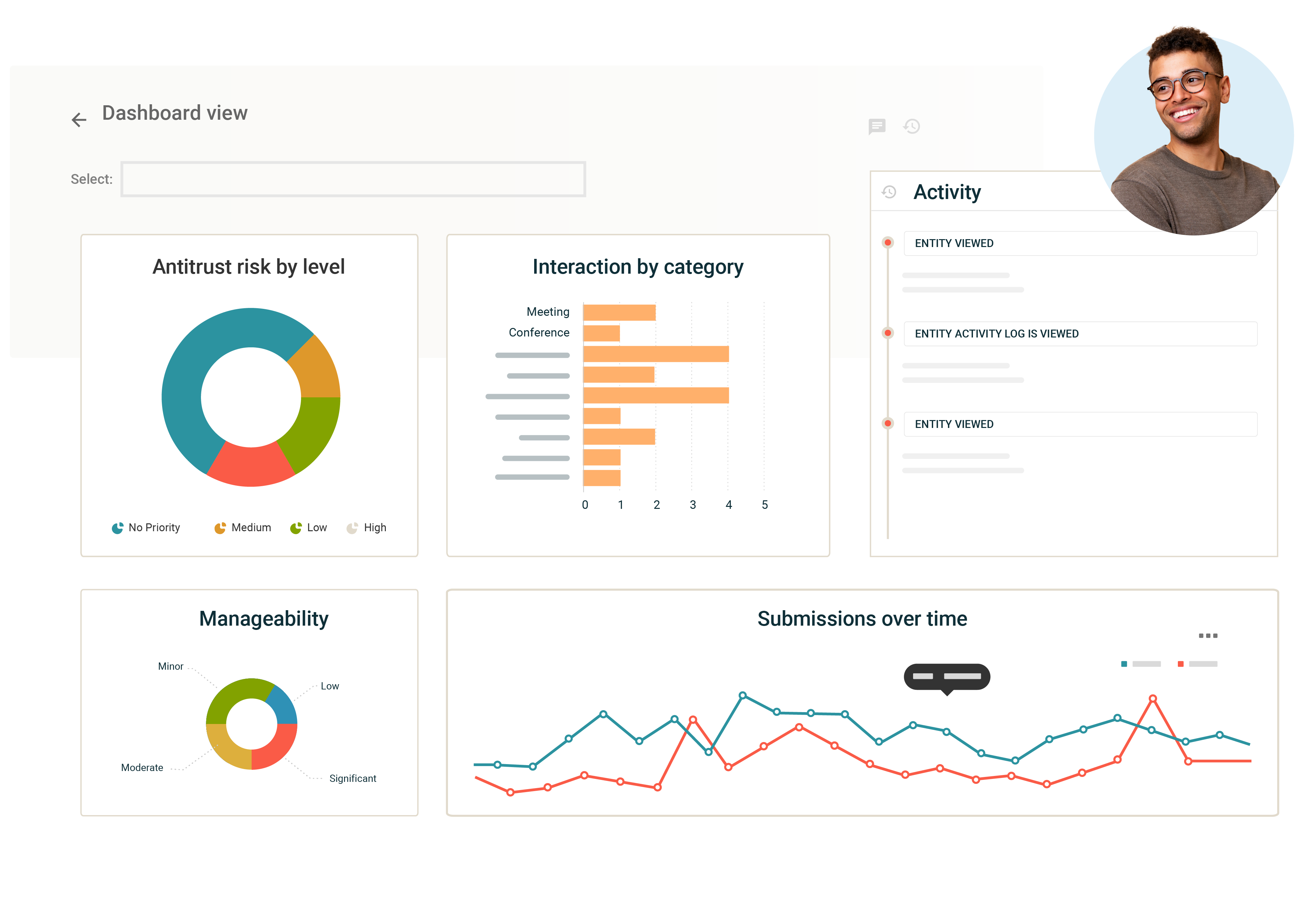Aerospace and Defense
Compliance Solutions for the Aerospace and Defense Industry
Benefit from a centralized and data-driven approach to corporate compliance, supplier due diligence, and third-party risk management—trusted by major aerospace and defense companies worldwide. Capture a sophisticated picture of overall regulatory risk and compliance in one place.

Trusted by the world’s leading companies
Why leading aerospace and defense companies rely on GAN Integrity
GAN Integrity is how compliance teams at aerospace and defense companies get the tools and expertise to stay ahead of risk. With less effort and more reach, you finally get a better way to do your good work.
See everything – Gain a comprehensive view of regulatory risk and compliance in one centralized platform.
Adapt to anything – Leverage dynamic workflows and integrations to stay ahead of regulatory changes and evolving program requirements.
Get all the help you need – Receive dedicated support from GAN Integrity’s team of experts.
Compliance challenges for the aerospace and defense industry

As a compliance professional in aerospace and defense, you often face an unfair fight. You must navigate a complex landscape of local and international Anti-Bribery and Anti-Corruption (ABAC), Environmental, Social, and Governance (ESG) regulations, International Traffic in Arms Regulations (ITAR), Department of Defense (DoD) regulations, and AS9100 industry standards.
Additionally, you must manage significant supply chain and third-party risks. The A&D supply chain is a vast, global ecosystem of customers, OEMs, multiple tiers of suppliers, and maintenance, repair, and overhaul providers. Compliance teams must address export controls, regulatory, geopolitical, operational, and security risks within this ecosystem. Ensuring third parties and suppliers implement appropriate controls is essential for maintaining compliance and safeguarding your organization's integrity.
Key areas of compliance in aerospace and defense
Aerospace and defense companies are complex enterprises. There’s many areas of compliance, ethics, and risk that need to be managed, spanning everything from Environmental, Social and Governance (ESG), to ITAR, to Anti-Bribery And Corruption (ABAC). These include:
- ABAC Compliance: Ensuring that anti-bribery and anti-corruption (ABAC) laws and standards are upheld.
- Supply Chain Due Diligence: Ensuring suppliers and partners also comply with relevant laws and standards. Due diligence may now be expected deeper into the supply chain beyond tier 1.
- Data Protection: Safeguarding sensitive information, including technical data, in an increasingly digital landscape.
- Environmental Compliance: Adhering to regulations aimed at minimizing the ecological footprint of operating activities.
- Labor Laws: Observing fair employment practices and labor standards.
- Intellectual Property Security: Protecting and respecting patents, trademarks, and copyrights.
- ITAR Compliance: Complying with International Traffic in Arms Regulations.
- Quality Control & Assurance: Ensuring products consistently meet required standards and safeguarding against counterfeit parts.
- Workplace Safety: Implementing standards for a safe working environment.
- Financial Reporting: Maintaining accuracy and transparency in financial dealings.
Steps to achieving compliance in the aerospace and defense industry
Achieving compliance in any organization involves a series of strategic steps:
Compliance in the Aerospace and Defense Industry
Risk Assessment
Identify potential compliance risks specific to your aerospace and defense operations.
Objective Setting
Define clear compliance goals that align with your operational objectives.
Documentation
Maintain thorough records of compliance efforts and decisions.
Training
Educate employees about compliance requirements tailored to the aerospace and defense industry.
Monitoring and Auditing
Regularly review compliance status and adjust practices as needed.
Reporting System
Establish clear channels for reporting issues and disclosures.
Issue Response
Quickly address non-compliance issues to prevent disruptions.
Continuous Improvement
Regularly update compliance practices to stay ahead of regulatory changes.
GAN Integrity for Aerospace and Defense Companies
GAN Integrity helps aerospace and defense companies navigate these challenges with a unified, easy-to-use compliance platform that organizes requirements, automates tasks, and provides powerful reporting, making it easier for you to do your good work. With GAN Integrity, compliance teams can see everything, adapt to anything, and get all the help they need.
ABAC Program Management
Ensure your organization upholds ethical integrity and ABAC compliance through comprehensive risk assessments, effective policy management, and continuous monitoring. Capabilities include:
- Third-party due diligence: Mitigate bribery and corruption risks with integrated questionnaires, sanctions checks, and risk intelligence data.
- Disclosure management: Consolidate and assess conflicts of interest, gifts, travel, entertainment, and political and charitable contribution disclosures.
- Reporting and documentation: Maintain a complete audit trail and detailed reporting to easily demonstrate compliance to stakeholders and regulators.Deploy robust policies, including ABAC policies, codes of conduct, and conflict-of-interest guidelines.
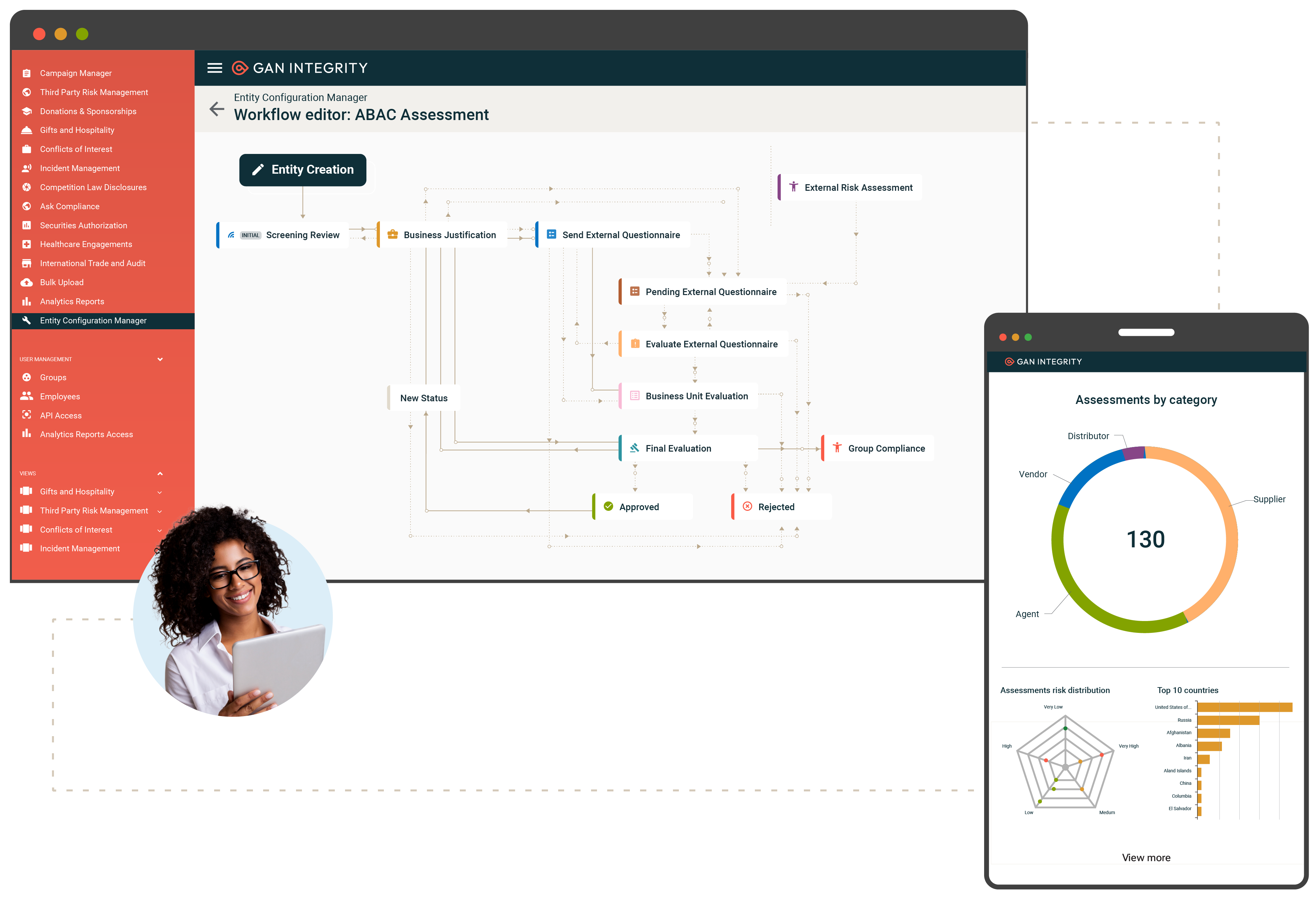
Conflict of Interests Management
Manage employee conflicts of interest disclosures with an easy to use, configurable platform. Capabilities include:
- Reporting and analytics: Role-based dashboards to identify areas of potential exposure with actions and remediation workflows to mitigate risks.
- Campaign Management: Create conflicts of interest campaigns to inform and engage employees with training, policies and regular disclosure campaigns.
- Third-party risk integration: Track conflicts of interest disclosures against third parties and suppliers for a comprehensive view of risk.
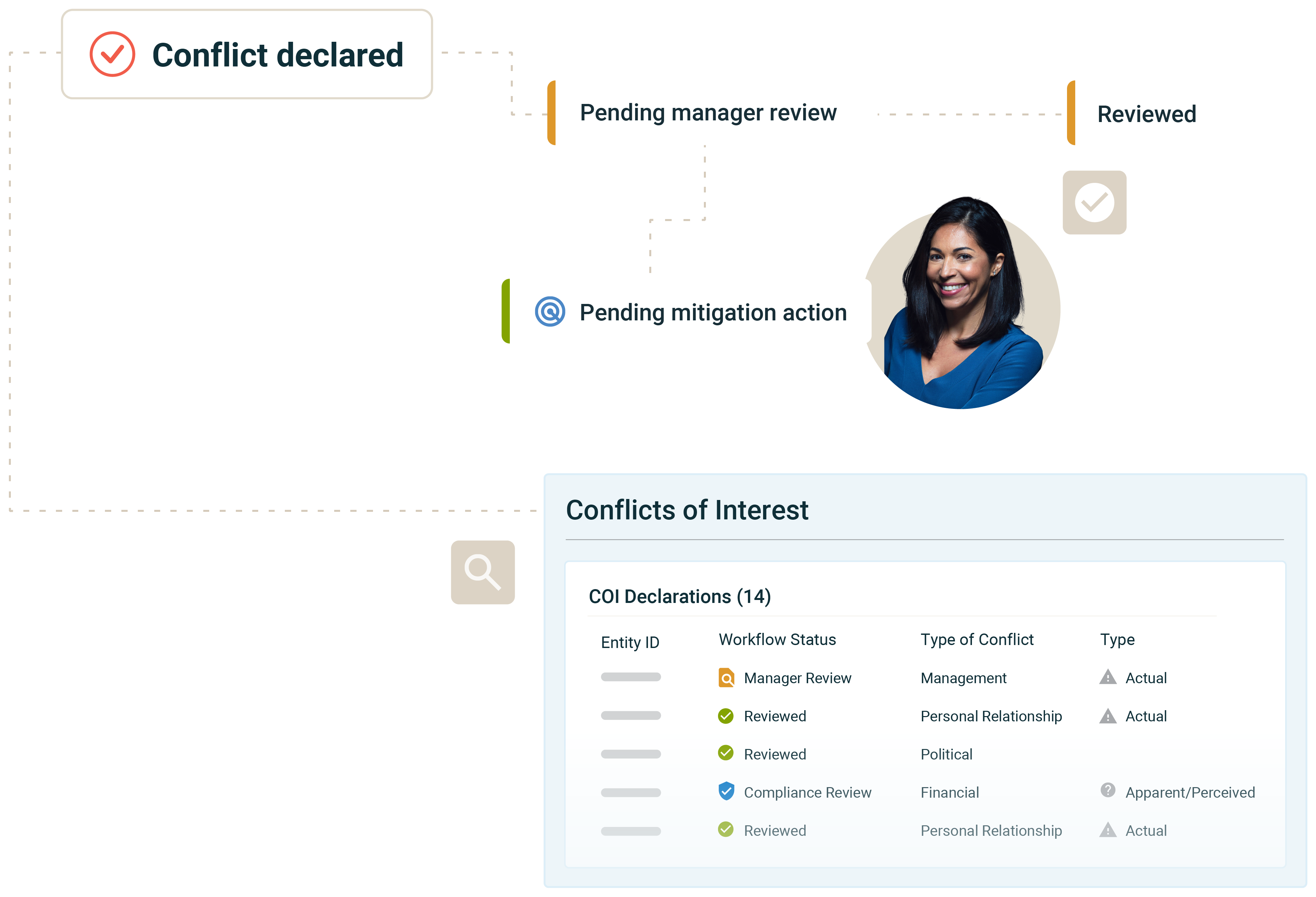
Supply Chain Due Diligence
Enhance supply chain risk management by consolidating processes, identifying and mitigating risks, and integrating data from various risk intelligence and business systems. Capabilities include:
- Automated risk assessments and continuous monitoring: Monitor suppliers continuously for adverse media, sanctions lists, PEP lists, forced labor, and ESG (Environmental, Social, and Governance) issues.
- High-risk supplier identification and management: Identify high-risk suppliers, manage them effectively, and track actions and mitigations to ensure compliance.
- Integrated due diligence assessments: Perform thorough due diligence across your business operations and workflows for seamless integration and enhanced efficiency.
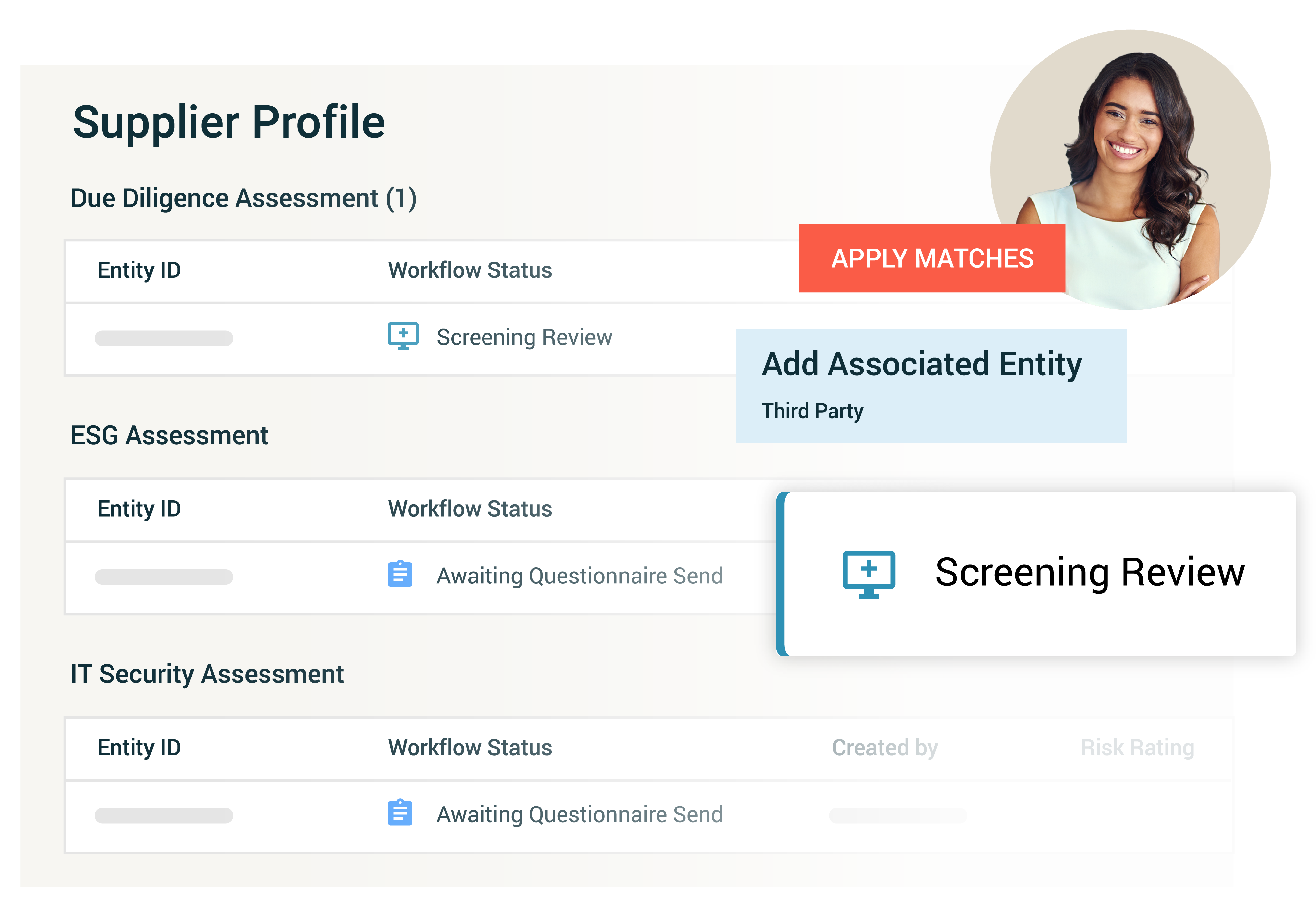
Disclosure Management
Consolidate your disclosures for conflicts of interest (COI), gifts, travel, entertainment, and political and charitable donations or contributions. Capabilities include:
- Policy management: Develop and enforce comprehensive disclosure policies. Educate and engage your workforce with targeted training and policy attestations.
- Flexible disclosure process: Simplify the submission of potential conflicts of interest with user-friendly forms, ensuring easy access for employees.
- Automated approvals and reviews: Enhance compliance with automated approval and review workflows. Quickly escalate notifications to relevant stakeholders to address potential risks.
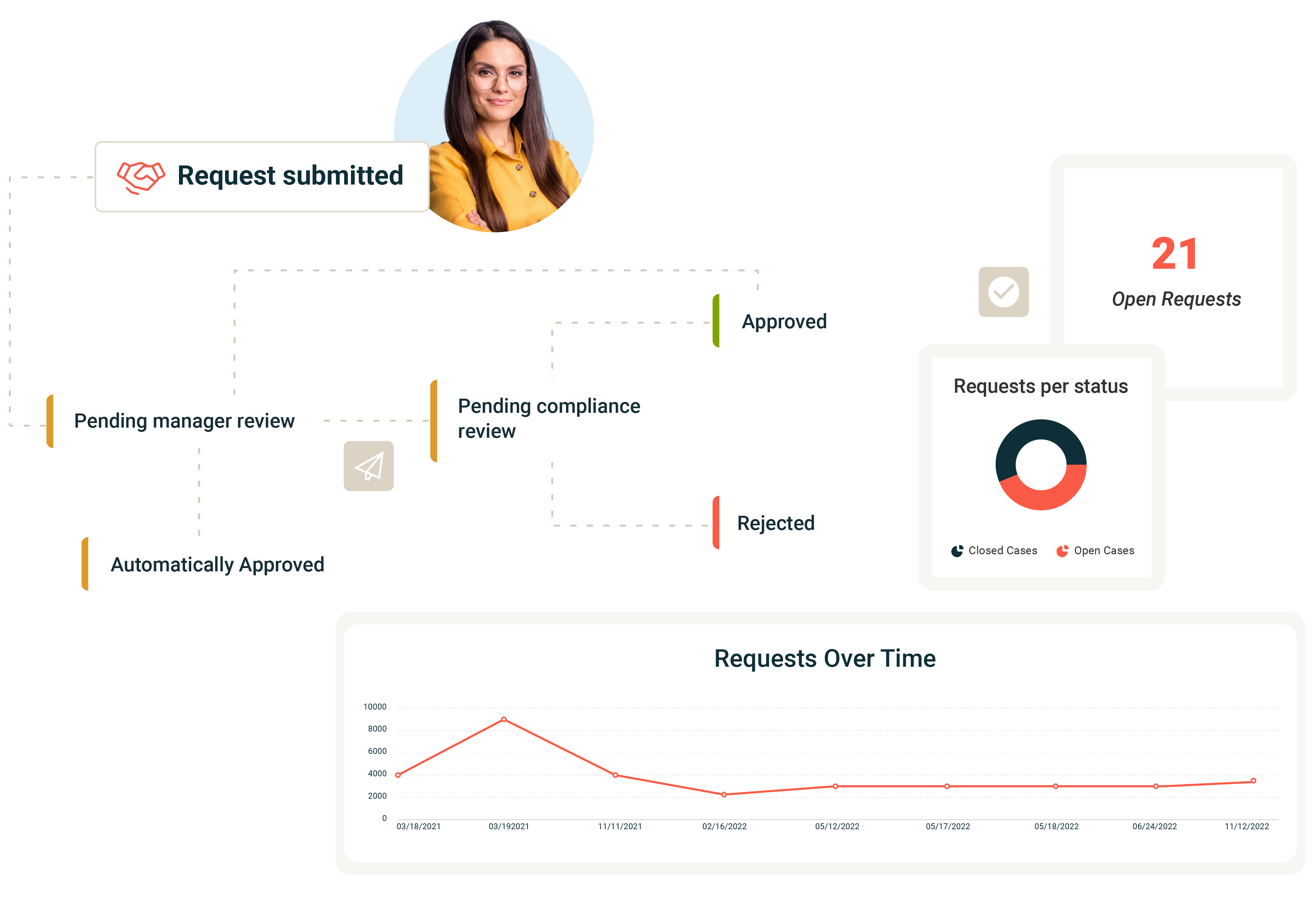
Reporting and Documentation
See everything across your compliance program, and generate reports and dashboards to demonstrate compliance program effectiveness to stakeholders and evidence to regulators. Capabilities include:
- Reporting and analytics: Executive, role-based dashboards to review the effectiveness of your compliance program initiatives.
- Evidence-based compliance: Maintain an auditable trail of all activity with the platform’s integrated and automated audit log.
- Compliance insights: See risk trends and patterns within your program, including third-party and supply chain risk, policies and disclosures.
